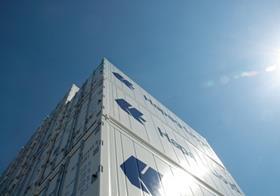
Drewry Shipping Consultants says it expects the international refrigerated shipping business will make a robust recovery during the next few years, despite a fall in seaborne reefer during 2009.
In its latest annual review of the reefer shipping sector, published this week, the consultancy makes a positive forecast for recovery but also sounds a warning about what it describes as an impending battle between the two existing types of reefer fleet – specialised and containerised.
By mid-2010, says the review, the specialised reefer fleet above 100,000ft3 had fallen to 727 vessels - down 17 per cent in under 10 years.
'The specialist reefer fleet has been shrinking for some time,' the group observes. 'The scrapping of specialised vessels has also increased since 2008 – averaging 37 vessels per year over the last two years.'
By contrast, reveals Drewry, the number of new containerships due to come into service in the next two years is greater than the whole of the remaining specialised fleet.
'This divergence between the two modes could see the specialised sector account for as little as 8.4 per cent of capacity berthed by 2012,' the company notes. 'Clearly containerships are set to dominate the market even further than they currently do.'
Commenting on the review, Drewry managing director Nigel Gardiner said: 'Ironically, the projected growth in seaborne reefer trade favours the specialised type of vessel. Yet this growth cannot be accommodated by the specialised fleets, handing the container operators a golden opportunity to increase their market share.'
Rationalisation within the specialised sector has accelerated in the past 12 months, Mr Gardiner added. 'There could be interesting times ahead to see whether the specialised operators rise to what could be a significant commercial opportunity for them or continue their decline.'
Commodity demand patterns
Drewry’s review shows worldwide perishable reefer trade grew by 44.3m tonnes between 2000 and 2009, with the highest percentage growth coming in the exotic fruit category.
The seaborne portion increased by 22.3m tonnes for the same period, with the largest volume growth in meats.
Just as notable was a change in import patterns, with volumes into western Europe, although considerable, declining whilst eastern European imports grew from 9 per cent to 14 per cent of overall trade.
Meanwhile, Drewry's report also warns about an impending increase in operating costs, which could present problems for reefer shipping operators and, by extension, the fresh produce trade.
'Recession brought a number of reefer operators to their knees but it also served to keep operating costs down,' states the report. 'That is all predicted to change… raw material prices have started to rise as have the all important lube oils.'
A shortage of skilled seafarers also remains a problem, the company said, and wages, which were held back down during the downturn, are apparently set to spiral once more.
'Overall, the trend will be for rising costs post-2011,' the report says. 'Fleet operators need to take heed as the growing containership fleet is likely to keep rates down while the cost base rises.'
Reefer Shipping Market Review and Forecast 2010/11, an annual report by Drewry Shipping Consultants Ltd, is available for purchase from the Drewry website.



